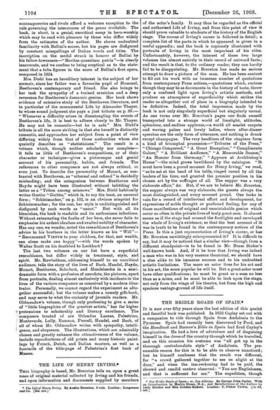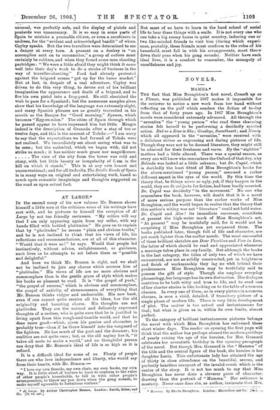THE BRIDLE ROADS OF SPAIN.*
IT is now over fifty years since the last edition of this quaint and fanciful book was published. In 1852 Cayley set out with a companion to ride through Spain from Andalusia to the Pyrenees. Spain had recently been discovered by Ford, and the Handbook and Borrow's Bible in Spain had fired Cayley's imagination. He had a love of adventure and of disguising himself in the dress of the country through which he travelled, and on this occasion his costume was "all got up in the thorough contrabandista style" of Andalusia. The pre- sumable reason for this is to be able to observe unnoticed; but be himself confesses that the result was different, for "a crowd gathered together to see us alight at the door," and when the .inn-reckoning had to be paid, the shrewd and candid ventero observed : "You are Englishmen, and that is sufficient for me." The expedition, though " The Bridle Roads of Spain; or, Las diforjas. By George Jobn Cayley. With an Introduction by Martin Hume, M.A., and Recollections of the Author by Lady Ritchie and Mrs. Cobden Sie.kert. London : T. Fisher Univin. [7s. (id. net.) unusual, was perfectly safe, and the display of pistols and poniards was unnecessary. It is so easy in some parts of Spain to mistake a peaceable citizen, or even a earabinero in undress, for the "evident and acknowledged bandit" of whom Cayley speaks. But the two travellers were determined to see a danger at every. turn. A peasant on a donkey is "an accomplice sent on to reconnoitre," a group of cutlers must certainly be robbers, and when they found some men shooting partridges: "We were a little afraid they might think it came well into their day's work to do a stroke of business in the way of traveller-shooting." Ford had already protested against the brigand scenes "got up for the home market." But at kit, in despair of a real adventure, Cayley was driven to do this very thing, to devise out of his brilliant imagination the appearance and death of a brigand, and to fire his own pistol into a frog-pond. He still cherished the wish to pass for a Spaniard ; but the numerous samples given show that his knowledge of the language was extremely slight., and many Spanish phrases are as greatly travestied in his mouth as the Basque for "Good morning," Egunon, which becomes "Egg-en-noon." The cities of Spain through which he passed appear to have impressed him but little. Meagre indeed is the description of Granada after a stay of ten or twelve days, and this is the account of Toledo :—" I am sorry to say that the expectations we bad formed of Toledo were not realised. We immediately set about seeing what was to be seen ; but the cathedral, which we began with, did not strike us much ; it has neither much grace nor magnificence.
The view of the city from the tower was cold and stony, with but little beauty or irregularity of fcrra in the hill on which it stands." This is at any rate honest and unconventional ; and for all its faults, The Bridle Roads of Spain is in many ways an original and entertaining work, based as much upon romantic imaginings and thoughts suggested on the road as upon actual fact.







































 Previous page
Previous page